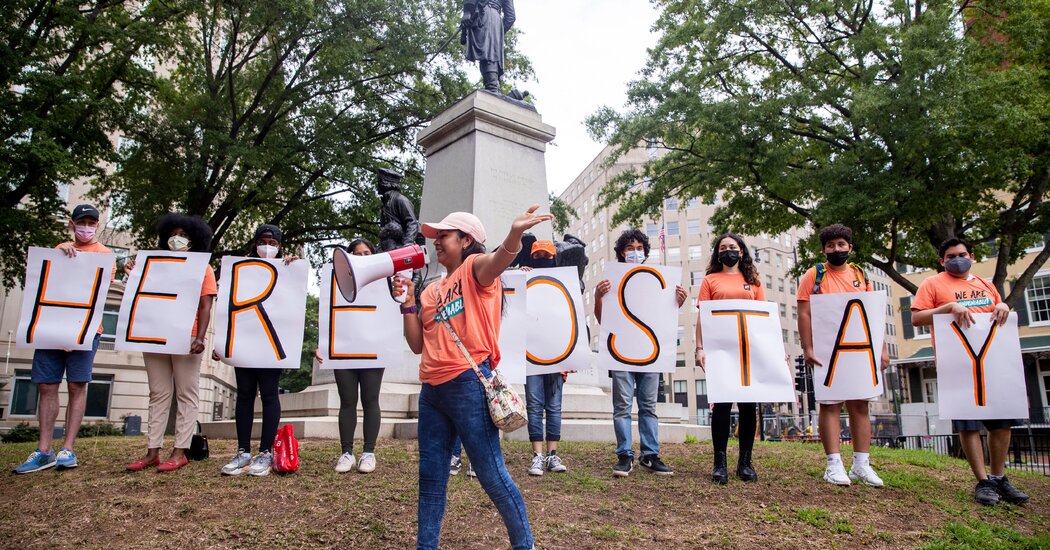
WASHINGTON — The Senate parliamentarian dealt a major setback on Sunday to Democrats’ plan to use their $3.5 trillion social policy bill to create a path to citizenship for an estimated 8 million undocumented immigrants.
Elizabeth MacDonough, the Senate parliamentarian, who serves as the chamber’s arbiter of its own rules, wrote that the “policy changes of this proposal far outweigh the budgetary impact scored to it and it is not appropriate for inclusion in reconciliation,” according to a copy of her decision obtained by The New York Times.
Democrats had been seeking to grant legal status to undocumented people brought to the United States as children, known as Dreamers; immigrants who were granted Temporary Protected Status for humanitarian reasons; close to one million farmworkers; and millions more whom are deemed “essential workers.”
Immigration advocates had pushed the plan as their best chance this Congress to improve the lives of millions of immigrants, after attempts to reach a bipartisan deal with Republicans fell apart.
“We are deeply disappointed in this decision but the fight to provide lawful status for immigrants in budget reconciliation continues,” Senator Chuck Schumer, Democrat of New York and the majority leader, said in a statement, adding that Democrats would be meeting with the parliamentarian. “The American people understand that fixing our broken immigration system is a moral and economic imperative.”
Senator Richard J. Durbin of Illinois, the No. 2 Democrat, and Senator Alex Padilla, Democrat of California, also released a statement saying they had prepared “an alternative proposal for the parliamentarian’s consideration in the coming days.”
Meanwhile, immigration advocates were already urging the Democrats who control the Senate to vote to disregard Ms. MacDonough’s decision and include the immigration overhaul in the package anyway.
Greisa Martinez Rosas, director of United We Dream Action, called the parliamentarian an “unelected adviser” and said Democrats in Congress “hold all the power to do the right thing.”
Under the Democrats’ proposal, undocumented immigrants would have been eligible to become U.S. citizens if they passed background and health checks and paid a $1,500 fee, among other requirements. The plan would have also recaptured at least 226,000 visas that went unused in previous years because of “Covid-19 or bureaucratic delay,” allowing more visas to be issued.
Democrats had been hoping to include the immigration overhaul in their sweeping legislation to expand the social safety net, which they plan to muscle through under a fast-track process known as reconciliation that shields it from a Republican filibuster. That would test the bounds of the Senate’s rules, which require that any measure included in a reconciliation bill have a direct impact on federal spending and revenues.
Ms. MacDonough’s decisions are merely advisory, but several Democratic senators have indicated they would be reluctant to overrule her. She did not immediately respond to a request for comment.
The budgetary cost of the changes in immigration law — which affect health care benefits, Medicaid spending and tax credits — exceeds $139 billion over 10 years, according to preliminary figures from the Congressional Budget Office. Democrats estimate the legalization push would add $1.5 trillion to the U.S. economy over the next decade, creating more than 400,000 jobs.
Republicans argue the immigration overhaul is only tangentially related to the budget, and that Congress should focus on controlling the southern border with Mexico before attempting to change immigration law.
“Having worked on several comprehensive immigration reform bills, I believe that using the reconciliation process to provide legal status to illegal immigrants would be a disaster,” said Senator Lindsey Graham of South Carolina, the top Republican on the Budget Committee. “It would have led to an increased run on the border — beyond the chaos we already have there today.”
Senator Mitch McConnell of Kentucky, the top Republican, last week called Ms. MacDonough an “honest broker,” and said following her decisions was “essential” to the function of the Senate.
“The parliamentarian, both sides agree, is the final word,” Mr. McConnell said. “I can’t blame the other side for trying to use reconciliation as expansively as they want to.”
In her decision, Ms. MacDonough repeatedly emphasized the vastness of the policy change proposed by the Democrats.
“The reasons that people risk their lives to come to this country — to escape religious and political persecution, famine, war, unspeakable violence and lack of opportunity in their home countries — cannot be measured in federal dollars,” the parliamentarian wrote.
She argued that “changing the law to clear the way” to legal status for millions of undocumented immigrants is a “tremendous and enduring policy change that dwarfs its budgetary impact.”
Immigration advocates have readied some backup plans in case the parliamentarian did not rule in their favor, including a plan to update the immigration registry, a process for immigrants to become legal permanent residents on the basis of their longstanding presence in the country.
Kerri Talbot, the deputy director of the Immigration Hub, said immigration advocates would not give up.
“This is not the end of the process,” she said in a statement. “As we’ve said before, this is not a one-off. We have always known that this would be a back and forth where we would have to present several options. What we know is true: A path to permanent residency and citizenship has a significant budgetary impact, great bipartisan support, and — above all — it is critical to America’s recovery.”



